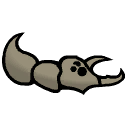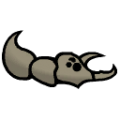Spelopede
| This article is a stub. You can help RimWorld Wiki by expanding it. Reason: Do spelopedes (after hive destroyed) still attack colonists like megaspiders do? Add to analysis. |
Spelopede
A medium-sized bioengineered insectoid the size of a sheep. The spelopede is the middle caste of a hive, taking care of most work tasks as well as fighting with its digging claws. It's dangerous in combat, but slow on open ground.
Base Stats
Armor
- Armor - Sharp
- 18%
- Armor - Blunt
- 18%
Pawn Stats
- Combat Power
- 75
- Move Speed
- 3.65 c/s
- Health Scale
- 170% HP
- Body Size
- 0.8
- Mass - Baby
- 9.6 kg
- Mass - Juvenile
- 24 kg
- Mass - Adult
- 48 kg
- Carrying Capacity
- 60 kg
- Filth Rate
- 1
- Hunger Rate
- 0.4 Nutrition/Day
- Diet
- omnivorous, animal products
- Life Expectancy
- 6 years
- Manhunter Chance
- 50%
- Manhunter Chance (Taming)
- 0%
- Trainable Intelligence
- Advanced
- Wildness
- 30%
- Minimum Handling Skill
- 2
- Maturity Age
- 0.2 years (12 days)
- Juvenile Age
- 0.03 years (1.8 days)
- Toxic Resistance
- 100%
- Toxic Environment Resistance
- 80%
- Comfortable Temp Range
- -25 °C – 60 °C (-13 °F – 140 °F)
Production
- Meat Yield
- 112
 Insect meat
Insect meat
Melee Combat
- Attack 1
- Head claw
7 dmg (Cut)
10 % AP
2 second cooldown - Attack 2
- Head
6 dmg (Blunt)
9 % AP
2 second cooldown
0.2 chance factor - Average DPS
- 2.17
- defName
- Spelopede
- tradeTags
- AnimalInsect
Spelopedes are giant, bio-engineered, subterranean invertebrates and the middle of the three insectoid types in both size and danger.
Summary
Spelopedes can inhabit any terrain where an infestation has spawned. They are dangerous in combat, but slow on open ground.
Their body is composed of a head, head claw, mouth, pronotum, shell, elytras (left and right), and two pairs of legs (front and back).
All insectoids, including the spelopede, experience hypothermic slowdown instead of fatal hypothermia, have 100% Toxic Resistance, rendering them immune to toxic buildup from any source, and 80% Toxic Environment Resistance, rendering them resistant to environmental effects such as rot stink. They experience also pollution stimulus when in polluted terrain.![]() See that page for full details.
See that page for full details.
Insectoids are incapable of sexual reproduction like other animals, due to their breeding type (EusocialInsect). Instead, wild insects reproduce via hives which create new insectoids periodically, up to a maximum value each hive can support. Tamed insectoids cannot reproduce at all. For more detail, see the Hive page.
| Effect of its armor on melee damage |
|---|
Analysis
Spelopedes are between megaspiders and megascarabs, with in-the-middle speed and health.
Wild Spelopedes always generate hostile, making them difficult to tame as they will try to attack the animal handler. However, animal interactions during the process will interrupt any attacks. It may be ideal to equip your handler with armor, or to select a handler with a high melee skill for a higher melee dodge chance to reduce the risk of harm, though this is not strictly necessary.
Spelopedes are practically impossible to tame when they first spawn from an infestation. In order to try and tame a Spelopede, you will need to down them, then destroy all hives from the infestation. With Too Deep: Infestation event and Wastepack Infestations, there are no hives, so all you need to do is down the insect. This does not make them non-hostile, but it will prevent them from seeking out colonists like a raider would. Note that wild Spelopedes unlike other animals cannot be operated on and thus can't be anesthetized, and they are prone to waking up and attacking the pawn treating them, Waiting for blood loss to reach extreme can prevent this.
They are rather accessible and easy to maintain haulers having the lowest wildness, being only beaten by Huskies, and Labrador retrievers however for most purposes the megaspider is the better option. Megaspiders are stronger in combat, but have 40% wildness and move 0.05 c/s slower along with slightly higher hunger rate.
Training
This animal can be trained as follows:
| Guard: | |
|---|---|
| Attack: | |
| Rescue: | |
| Haul: | |
*As of version 1.1.2610, all animals can be tamed. The percentage of likelihood of success depends on factors such as the Animals Wildness Percentage, Pawn Handling Skill, and others. More information can be found on the animals page.
Health
| Part Name | Health | Quantity | Coverage[1] | Target Chance[2] | Subpart of | Internal | Capacity[3] | Effect if Destroyed/Removed |
|---|---|---|---|---|---|---|---|---|
| Shell | 51 | 1 | 100% | 34,0% | N/A[4] | - | - | |
| Elytra | 51 | 2 | 5% | 5,0% | Shell | - | - | |
| Stomach | 34 | 1 | 5% | 5,0% | Shell | Digestion |
−50% Digestion | |
| InsectHeart | 34 | 1 | 3% | 3,0% | Shell | Breathing Blood Pumping Blood Filtration Digestion |
Death | |
| Pronotum | 34 | 1 | 18% | 6,3% | Shell | Eating Talking Breathing |
Death | |
| InsectHead | 51 | 1 | 65% | 1,287% | Pronotum | - | Death | |
| Brain | 17 | 1 | 20% | 2,34% | InsectHead | Consciousness |
Death Damage always results in scarring. | |
| Eye | 17 | 2 | 12% | 1,404% | InsectHead | Sight |
−25% Sight. −100% if both lost. Damage always results in scarring. 0% Hit Chance against Blunt damage. | |
| Antenna | 17 | 2 | 8% | 0,936% | InsectHead | - | - | |
| InsectNostril | 17 | 1 | 6% | 0,702% | InsectHead | - | - | |
| InsectMouth | 17 | 1 | 8% | 0,936% | InsectHead | Eating Manipulation |
−100% Manipulation −90% Eating[5] | |
| HeadClaw | 25.5 | 1 | 15% | 1,755% | InsectHead | - | Can no longer use head claw attack[6] | |
| InsectLeg | 34 | 6 | 6% | 6,0% | Shell | Manipulation Moving |
−16.7% Moving[7] |
- ↑ Coverage determines the chance to hit this body part. It refers to the percentage of the super-part that this part covers, before its own sub-parts claim their own percentage. For example, if the base coverage of the super-part is 100%, and the coverage of the part is 20%, 20% of hits would hit the part, and 80% the super-part. If the part had its own sub-part with 50% coverage, the chances would be 10% sub-part, 10% part, 80% super part.
- ↑ Target Chance is the actual chance for each part to be be selected as the target when each part's coverage has been taken into account(I.E. Neck covers 7.5% of Torso but Head covers 80% of Neck so it actually has only a 1.5% chance to be selected). This is not pure hit chance, as different damage types propagate damage in different ways. See that page for details.
- ↑ Note that capacities can affect other capacities in turn. Only the primary effect is listed. See specific pages for details.
- ↑ This is the part that everything else connects to to be considered 'connected'.
- ↑ Note that eating won't go below 10%. See specific pages for details.
- ↑ Cut attack of power 12, cooldown 2.6s
- ↑ If Moving drops below 16% a pawn cannot move.
Gallery
Version history
- Beta 19/1.0 - All insects main attack cooldowns 2.5 -> 2.9
- 1.3 - Manhunter on tame fail decreased from 20% to 10% - manhunter on harm increased from 35% to 50% - wildness decreased from 95% to 30% - trainability changed from intermediate to advanced - gestation changed from N/A to 6
- 1.3.3200 - Fix: Remove gestation period stat, since they do not breed.
- Biotech DLC release - Now gains pollution stimulus on polluted terrain.




